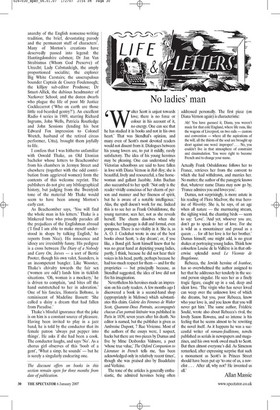No ladies' man
w 6 alter Scott is unjust towards love., there is no force or i colour n his account of it, no energy. One can see that he has studied it in books and not in his own heart.' That was Stendhal's opinion, and many even of Scott's most devoted readers would not dissent from it. Dialogues between his young lovers are, to put it mildly, rarely satisfactory. The idea of his young heroines may be pleasing. One can understand why Victorian schoolboys are said to have fallen in love with Diana Vernon in Rob Roy; she is beautiful, lively and resourceful, a fine horsewoman and gallant Jacobite. John Buchan also succumbed to her spell: 'Not only is the reader vividly conscious of her charm of person and manner and her fineness of spirit, but he is aware of a notable intelligence.' Alas, the spell doesn't work for me. Indeed this is to see her as Frank Osbaldistone, the young narrator, sees her, not as she reveals herself. The charm dissolves when she speaks; her language is dull and formal, even pompous. There is no vitality in it. She is, as A. 0. J. Cockshut wrote in one of the best books about Scott, 'a day dream'; or, if you like, a Bond girl. Scott himself knew that he was no great hand at depicting young ladies, partly, I think, because he did not hear their voices in his head, partly, perhaps because he had too much respect for them — and for the proprieties — but principally because, as Stendhal suggested, the idea of love did not fire his imagination.
Nevertheless his heroines made an impression on his early readers. A few months ago I discovered a book in a second-hand shop (appropriately in Melrose) which substantiates this claim. Galerie des Femmes de Walter Scott, Quarante-Dewc Portraits, accompagnes chacun d'un portrait litteraire was published in Paris in 1839, seven years after his death. No editor is named, but the publisher is given as Ambroise Dupont, 7 Rue Vivienne. Most of the authors of the essays were, I suspect, hacks but there are two pieces by Dumas and five by Mme Desbordes Valmore, a poet 'whose true value,' The Oxford Companion to Literature in French tells me, 'has been acknowledged only in relatively recent times', though she was praised also by Baudelaire and Verlaine.
The tone of the articles is generally enthusiastic, the admired heroines being often addressed personally. The first piece (on Diana Vernon again) is characteristic: Ah! You have guessed it, Diana, you weren't made for that cold England, where life runs, like the wagons of Liverpool, on two rails — custom and convention — where all the aspirations of the will, all the thirsts of the soul are brought up short against one word: improper! . . . No, you couldn't live in that atmosphere of constraint and dissimulation. You were right to become French and to change your name.
Actually Frank Osbaldistone follows her to France, retrieves her from the convent to which she had withdrawn, and marries her. No matter; the author of the panegyric knows that, whatever name Diana may now go by, 'France admires you and loves you'.
Dumas, not surprisingly, is more astute in his reading of Flora MacIvor, the true heroine of Waverley. She is, he says, of an age when all nature — the murmuring stream, the sighing wind, the chanting birds — seem to say: 'Love'. 'And yet, whoever you are, don't go to speak to her of love. For she is wild as a mountaineer and proud as a queen. . . for all her love is for her brother.' Dumas himself, one might add, is no great shakes at portraying young ladies Think how colourless Louise de la Valliere is in that otherwise splendid novel Le Vicomte de Bragelonne.
Rebecca, the Jewish heroine of Ivanhoe, has so overwhelmed the author assigned to her that he addresses her tenderly in the second person singular. He sees her as a finely tragic figure, caught up in a sad, deep and silent love. 'The virgin who has never loved can weep over the unknown love of which she dreams, but you, poor Rebecca, know who your love is, and you know that you will never get him' The same author, Frederic Soulie, wrote also about Rebecca's rival, the lovely Saxon Rowena, and so intense is his feeling that he seems almost to be rewriting the novel itself. As it happens he was a successful writer of romans-feuilletons, novels published as serials in newspapers and magazines, and his own work owed much to Scott. But then almost everyone's did. As Simenon remarked, after expressing surprise that such a monument as Scott's in Princes Street should have been put up 'to one of us, a novelist. . . After all, why not? He invented us all.'
Allan Massie




































 Previous page
Previous page